Taylor 512CE Grand Concert - Torrefied Sitka Top, Urban Ironbank b/s, Cutaway, Electronics 2022 (#1208082050)
- Vendor
- Taylor
- Regular price
- $3,499.00
- Sale price
- $3,499.00
- Regular price
-
$3,499.00 - Unit price
- /per
Adding product to your cart
- Description
- Features
- Specs
- Inspection and Set-up
- Humidity Care
*Photos shown are of the actual guitar. Serial Number 1208082050.
The 512ce is one of our first models to feature back and sides of solid Urban Ironbark, a dense, hard tonewood that yields a rich, sophisticated response with a deep low end and high-fidelity voice reminiscent of Indian rosewood, along with some of mahogany's midrange punch and focus. The Grand Concert 512ce pairs Urban Ironbark with a torrefied Sitka spruce top, lending a played-in character that makes for a warm, piano-like sound with remarkable balance across the tonal spectrum. With V-Class bracing inside, this compact acoustic-electric serves up room-filling projection and blooming sustain, offering a muscular quality that remains sensitive to a soft touch. Appointments include new Aerial inlays in Italian acrylic, a single-ring abalone rosette trimmed with maple and black purfling, and a tastefully subtle edgeburst.
- CASE/GIG BAG: Hardshell Case Included.
Grand Concert
A smaller-bodied guitar ideally suited for fingerstyle.
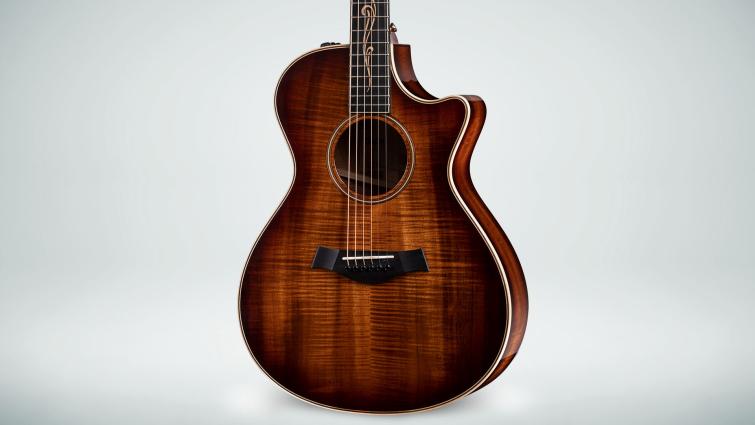
Urban Ironbark
This tonewood from our urban wood initiative yields power, fidelity and depth for a supremely balanced, muscular sound.
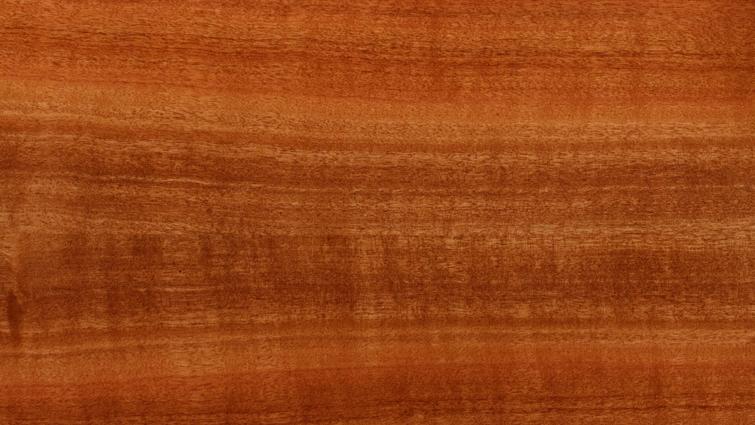
Sitka Spruce
The soundboard choice for most guitars, Sitka spruce produces a broad dynamic range and accommodates a versatile range of playing styles.

Expression System® 2
The Expression System® 2 captures more of a guitar's dynamic properties using a breakthrough behind-the-saddle design.
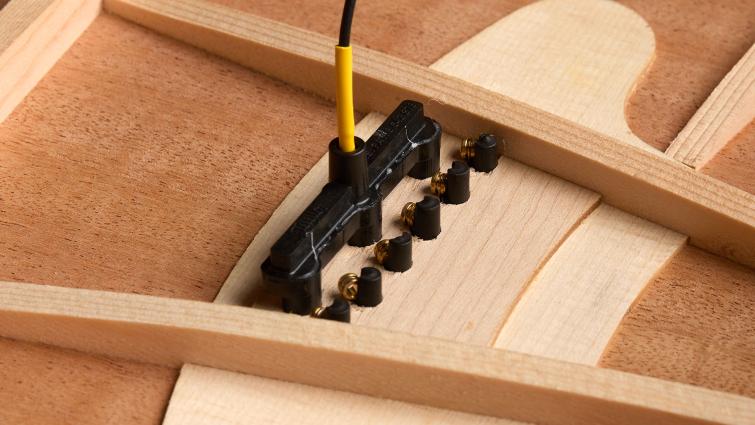
Venetian Cutaway
The Venetian cutaway is known for its soft, round lines. The sloping peak of the cutaway will vary depending on the shape of the body.
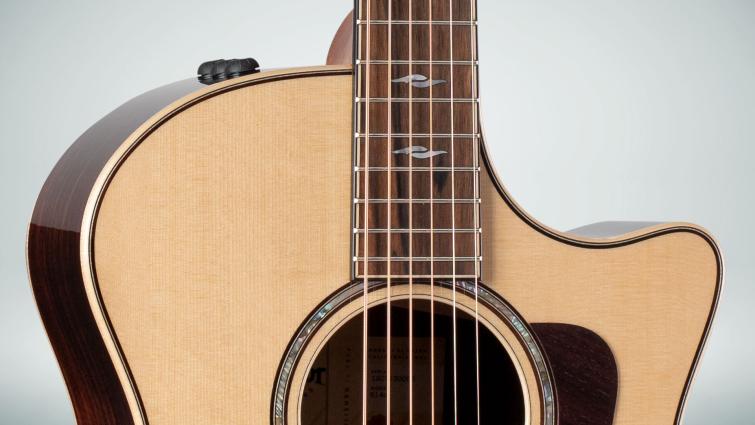
V-Class Bracing
Our patented V-Class bracing is a revolutionary new pattern — a new sonic engine — that marks a major shift away from traditional steel-string bracing patterns.
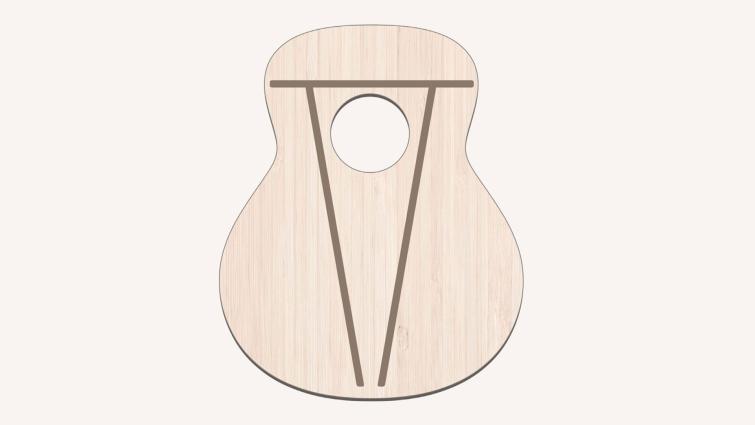
Highlights
- Scale Length: 24-7/8"
- Bracing: V-Class Bracing
- Pickguard: Tortoise
- Tuners: Taylor Nickel
- Strings: Phosphor Bronze Light
- Body Width: 15"
- Nut & Saddle: Black Tusq Nut, Micarta Saddle
- Truss Rod Cover: Black Plastic
- Number of Frets: 20
- Case: Taylor Deluxe Hardshell Brown
- Body Length: 19 1/2"
- Body Depth: 4 3/8"
Body
- Binding Edge Treatment: West African Crelicam Ebony
- Back Config: 2-piece or 4-piece Simons Wedge
- Rosette Size: Single Ring
- Back/Side Finish: Gloss
- Backstrap Wood: None
- Stain/Sunburst: Medium Brown Stain Back/Sides/Neck
- Armrest: No
- Top Finish: Gloss
- Backstrap Finish: None
- Bridge Inlay: None
- Armrest Binding: None
- Rosette Material: Ivoroid
- Wedge: None
Neck
- Neck Width: 1-3/4"
- Fretboard Binding/Edge Treatment: West African Crelicam Ebony
- Type of Neck Joint: Scarf
- Fretboard Wood: West African Crelicam Ebony
- Heel Length: 3-1/4"
- Fretboard Inlay: Aerial, Italian Acrylic, Faux Pearl
- Heel Cap Binding: West African Crelicam Ebony
- Neck/Heel: Tropical Mahogany
- Neck Finish: Satin
Other
- Bridge Pins: West African Crelicam Ebony
- Fingerboard Ext: None
- Buttons: Nickel
- Edge Trim: None
At Easy Music Center, we care for our instruments from the moment they arrive to when they ship to your door. All instruments are stored in a climate controlled environment and put through a 12-point inspection checklist before being shipped.
First, we check the finish of the instrument, carefully inspecting any blemishes on the surface. Next, we check the playability and setup by inspecting and adjusting the truss rod (if available), bridge, nut, and frets to manufacturer factory specifications. Any request made outside of manufacturer factory specifications can incur additional charges for parts and labor. If the instrument has electronics, we test all of the electronic components to make sure they are functioning properly.
After a thorough inspection, we then move on to maintenance. We start by lubricating any moving parts on the instrument, such as tuning machines. We then move on to cleaning and oiling the fretboard along with the frets.
Once maintenance is done, we stretch and tune the strings and play test the instrument. After this, we do a final inspection and clean/detail the instrument before packing it up for shipment.
We’re excited to be a part of your instrument buying experience.
Acoustic guitars and ukulele are made of wood, and wood is sensitive to changes in climate. Shifts in temperature or relative humidity can affect your instrument in multiple ways, some of which can lead to costly repairs if you’re not careful. Solid woods in particular are especially prone to the effects of climate fluctuation. For example, extended exposure to low relative humidity (below 40% RH) can dry out the wood, causing it to shrink and run the risk of cracking. Similarly, excessive humidity can cause the wood to absorb moisture and swell, potentially causing other problems. Without adequate humidity control (especially in drier local climates), acoustic instruments can crack and their necks can warp, causing problems with fretting, intonation and playability.
So how do you prevent this kind of damage? Easy: by keeping your guitars and ukulele properly humidified (ideally between 40-60% RH). The easiest way to do this is by storing your instruments in a case with a case two-way humidifier inside. A two-way humidifier will slowly absorb or release moisture inside your case, maintaining humidity to help ensure your instrument doesn’t suffer damage. Using a digital hygrometer can help you monitor humidity levels around your instrument.
Symptoms of a dry acoustic instrument:
- Low action. Strings are very close to the fretboard.
- Hump on the fretboard where the neck joins the body.
- Sunken top across the soundboard between bridge and fingerboard.
- The back of instrument looks very flat when it is dried out.
- Sharp fret ends extend beyond the edge of the fretboard.
- The plane of the neck angle on a dry instrument hits above the top of the bridge.
Symptoms of a wet acoustic instrument:
- High action. Strings that are unusually high off the fretboard, making it difficult to play.
- Unusually swollen top
- Unusual warp on the top, back or both at the end-block
- Improper neck angle. Sighting the neck to the bridge, the frets will appear to hit below the bridge.
The D’Addario Two-Way Humidification System
Using patented technology, the D’Addario Two-Way Humidification System features disposable, moisture-filled packets with a breathable membrane that provides two-way humidity control, meaning it can either release or absorb moisture to consistently maintain a predetermined relative humidity (RH) level of 45-50 percent.
Music Nomad Humilele Ukulele Humidifier
Music Nomad the leader in equipment care products, has developed an easy to use, no mess, and low maintenance Ukulele humidifier. The Humilele rests securely on top of the strings to safely and evenly hydrate your Ukulele to avoid these problems.
Final Notes on Humidity Control
To monitor the amount of humidity your instrument is receiving, we recommend the purchase of a digital hygrometer, a device that gauges and provides a read-out of humidity levels. It can be kept in the room where you store your instruments, or, better yet, in a central location inside the instrument case, preferably Velcro’d to the outside of the accessories compartment (facing the heel). The optimal range for your guitars and ukulele is 45-55% RH.


















